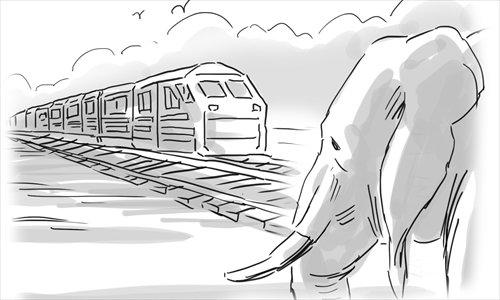Sri Lanka recognizes value of Chinese friendship in post-election era

Illustration: Liu Rui/GT
At the invitation of Chinese President Xi Jinping, Sri Lankan President Maithripala Sirisena will make his first China visit from Wednesday to Monday since he took office in January. During the visit, he will attend the annual Boao Forum for Asia. His state visit has been warmed up by Sri Lanka's foreign minister and financial minister, who visited China in February. Although bilateral relations have witnessed some twists and turns after Sri Lanka's latest presidential election, it could be anticipated that this meeting will herald a more progressive bilateral relationship.
High-level strategic cooperation between China and Sri Lanka have earned bipartisan backing in the country's congress. No matter which party takes power, it will sustain a good relationship with China. After Sri Lanka's presidential election in January, the foundation of bilateral relations is still solid. Sirisena has confirmed in a reply to his Chinese counterpart that his administration will be "committed to elevating Sri Lanka-China strategic partnership of cooperation to a new level, and will create favorable conditions for the expansion of Sri Lanka-China economic and trade cooperation and China's investment in Sri Lanka." Sirisena's response has endorsed the sustainability of Sri Lanka and China's friendship and the vision of both leaderships. Bilateral relationship will hold up in the face of delicate moments such as a change of government.
Economic activities between China and Sri Lanka are conducted at an equal footing for mutual benefits. China's investments, particularly its infrastructure projects, have helped Sri Lanka out of the trauma caused by a 25-year-long civil war, and greatly contributed to the country's rebuilding and economic revival. Sri Lanka's development sheds light on the development of South Asia as a whole.
Sri Lanka is putting a lot of efforts in forging itself to be a transport hub with international influence, and its current infrastructure capabilities have earned the favor of international organizations such as the IMF, which has praised Sri Lanka's considerable development after the civil war and its effective execution of its medium- and long-term plan to stimulate economic growth.
Sri Lanka's strategic goals will be better guaranteed if Colombo can integrate them with China-backed projects such as the 21st century maritime Silk Road and the Asian Infrastructure Investment Bank.
After Sirisena took office, his decision to halt and review Chinese port city project has caused some disturbances, but the project has been partly resumed for safety reasons due to the upcoming monsoon, a positive step toward the final settlement of the issue. Although the government has changed, Colombo knows clearly that this project is crucial to the development of the capital, as it will offer a great deal of employment and attract vast investments.
Sri Lanka needs foreign investment more than ever, and a consistent policy is crucial for attracting foreign investment. In this visit, Sirisena will not only show his commitment to carry forward the current infrastructure projects to the Chinese leadership, but also try to explore new areas for cooperation.
Speculation has been raised that Sri Lanka, under a new leadership, is trying to balance China and India, which was the first country Sirisena visited after taking office. In fact, competition is being sidelined by three-way cooperation. Chinese Foreign Minister Wang Yi has expressed China's stance in this tripartite relations, saying the warming-up of the Indian-Sri Lankan relations is welcomed by China. Both China and India should discuss issues together and play a positive role in the economic and social development of Sri Lanka by providing development aid from different channels.
Compared with the strong desires for reciprocity and inclusiveness, ideas such as a zero-sum game or sphere of influence, which lived in the Cold War era, are out of date in international politics.
China's "One Belt and One Road" project is a massive platform, where different countries can establish close connectivity and deepen cooperation with others. Regardless of cultures, religion or race, this platform aims at producing public goods to benefit the entire route. So far, the project is far from being full-fledged, and it needs every party's involvement for improvement, including Sri Lanka.
The author is an associate research fellow with the China Institute of International Studies. opinion@globaltimes.com.cn